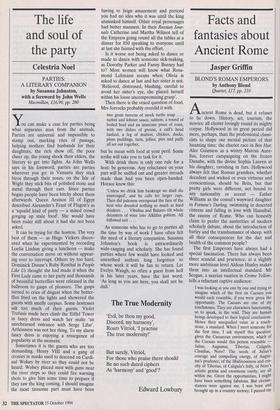The life and soul of the party
Celestria Noel
PARTIES: A LITERARY COMPANION by Susanna Johnston, with a foreword by John Wells Macmillan, £16.99, pp. 280 You can make a case for parties being what separates man from the animals. Parties are universal and impossible to stamp out, marking rites of passage, helping mothers find husbands for their daughters, the rich show off, the poor cheer up, the young shock their elders, the literary to get into fights. As John Wells says in his foreword, parties are parties wherever you go: in Vanuatu they stick biros through their noses, on the Isle of Wight they stick bits of polished stone and metal through their ears. Since parties began people have been bitchy about them afterwards. Queen Arsinoe III of Egypt described Alexander's Feast of Flagon's as a 'squalid kind of party — a mixed crowd gorging up stale food'. She would have been ruder still about it had she not been asked.
It can be trying for the hostess. The very best of them — as Hugo Vickers discov- ered when he experimented by recording Loelia Lindsay giving a luncheon — make the conversation move on without appear- ing ever to interrupt. Others try too hard. Dominick Dunne's Ruby Renthal in People Like Us thought she had made it when the First Lady came to her party and thousands of beautiful butterflies were released in the ballroom to gasps of pleasure. The gasps turned to cries of disgust when the butter- flies fried on the lights and showered the guests with smelly corpses. Some hostesses ask too much of their guests. Violet Trefusis made hers climb the Eiffel Tower in fancy dress and watch her make 'an unrehearsed entrance with Serge Lifar'. Artlessness was not her thing. To my alarm fancy dress is enjoying a resurgence of popularity at the moment.
Sometimes it is the guests who are too demanding. Henry VIII and a gang of cronies in masks used to descend on Cardi- nal Wolsey by river so they could not be heard. Wolsey placed men with guns near the river steps so they could fire warning shots to give him some time to prepare if they saw the king coming. I should imagine the most tiresome part must have been having to feign amazement and pretend you had no idea who it was until the king unmasked himself. Other royal personages had better manners. In their Russian Jour- nals Catherine and Martha Wilmot tell of the Empress going round all the tables at a dinner for 850 speaking to everyone until at last she fainted with the effort.
Is it worse not being asked to dance or made to dance with someone sick-making, as Dorothy Parker and Fanny Burney had to? Most women will know what Rosa- mond Lehmann means when Olivia is asked to dance at last and her sister is not. `Relieved, distressed, blushing, careful to avoid her sister's eye, she placed herself within his loose uncompromising grasp'.
Then there is the vexed question of food. Mrs Jorrocks probably overdid it with
two great tureens of mock turtle soup . . . turbot and lobster sauce, salmon, a round of boiled beef and an immense piece of roast, with two dishes of grouse, a calf's head hashed, a leg of mutton, chicken, ducks, plum puddings, tarts, jellies, pies and puffs all set out together,
but be mean with food at your peril. Some scribe will take you to task for it.
With drink there is only one rule for a host: be generous. Any reluctance on your part will be sniffed out and greater inroads made than had you been open-handed. Horace knew this:
`Unless we drink him bankrupt we shall die unavenged', and he calls for larger cups. Then did paleness overspread the face of the host who dreaded nothing so much as hard drinkers . . • Vibidius and Balatro tilt whole decanters of wine into Alklifan goblets. All followed suit ....
As someone who has to go to parties all the time by way of work I have often felt the need of a literary companion. Susanna Johnston's book is extraordinarily wide-ranging and scholarly. She has found parties where few would have looked and unearthed authors long forgotten to whose work it will be fun to return. Let Evelyn Waugh, so often a guest from hell in his later years, have the last word: `As long as you are here, you shall not be dull.'


























































 Previous page
Previous page